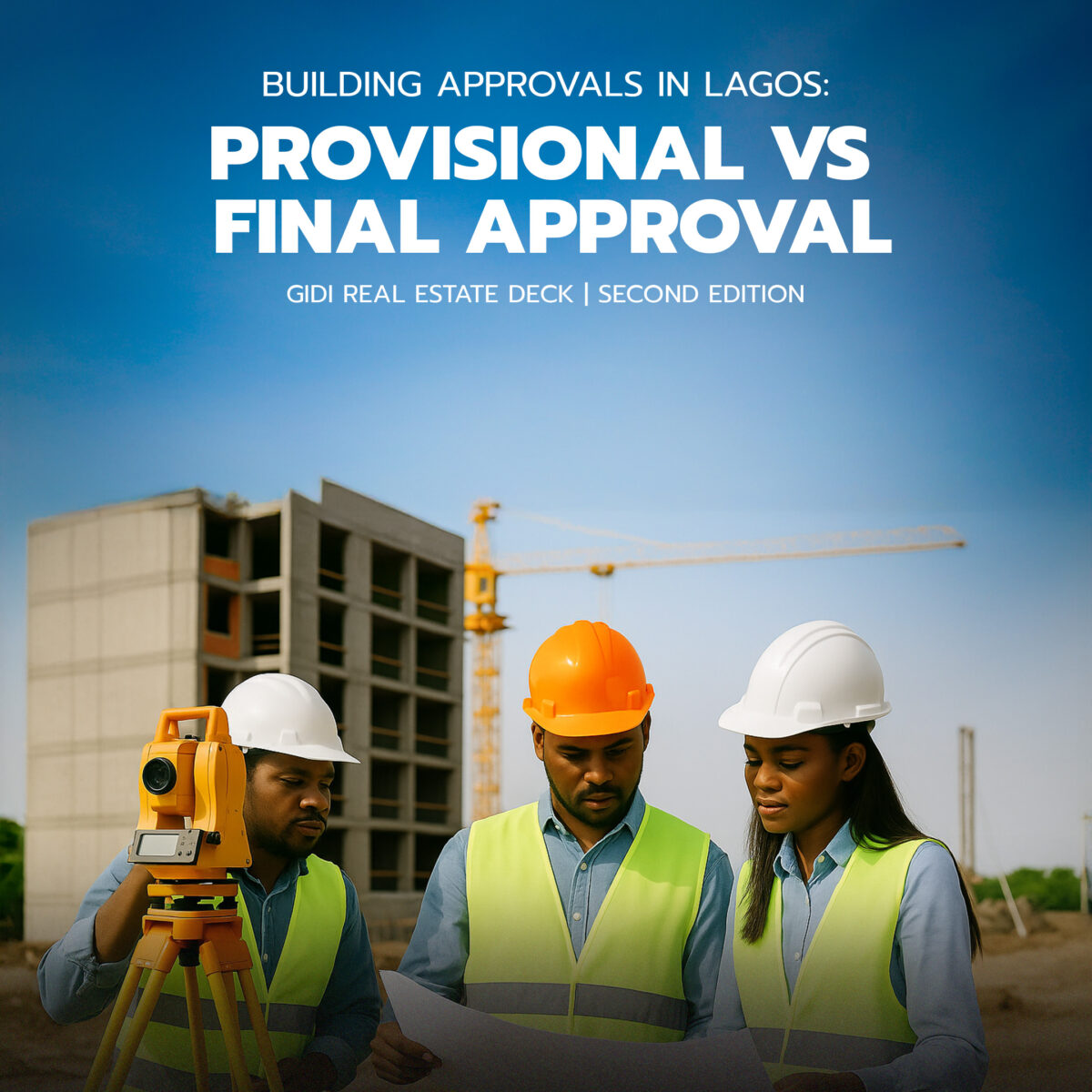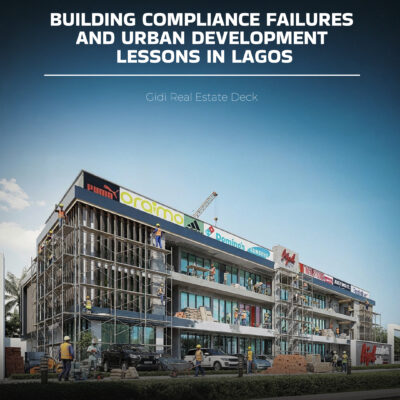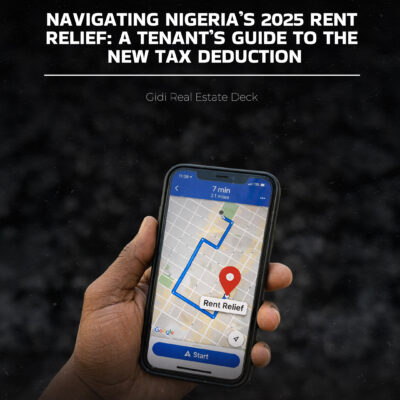In Lagos, property developers must navigate a strict approval process enforced by multiple agencies and laws. Key stakeholders include the Lagos State Ministry of Physical Planning & Urban Development (via LASPPPA—Lagos State Physical Planning Permit Authority), the Lands Bureau (which issues statutory land titles), the Lagos State Building Control Agency (LASBCA), and the Lagos State Real Estate Regulatory Authority (LASRERA).
Lagos laws (Urban & Regional Planning Law Cap. U2 and related regulations) require a registered Certificate of Occupancy (CoO) or Governor’s consent, or as applicable, before final permits are granted. LASRERA oversees developers’ licensing and transaction standards. In practice, the building approval process has two main stages: a provisional planning permit (if the title isn’t yet registered) and a final planning permit (once the title is secured).
“Provisional Planning Permit” refers to the temporary permit granted to applicants before the issuance of the final permit. This could be granted to applications before they obtain the registered Certificate of Occupancy or consent, or ratification, as applicable.
Building Approval Processes
Suppose Ola is the developer.
- Land Acquisition & Title: Ola first secures a plot in Lagos. He engages the State Lands Bureau to obtain a registered title (CoO or consent).
- Applying for Provisional Permit: While the title is processing, Ola submits his architectural drawings, survey plans, and proof of land ownership to LASPPPA. The Authority can issue a Provisional Planning Permit at this stage. This permit allows Ola to commence limited site work (e.g., marking out foundations) but explicitly cannot be used for demolition or major structural work.
- Upgrading to Final Permit: Once Ola obtains the registered title, he returns to LASPPPA with his CoO and other statutory documents. He then secures the Final Planning Permit, authorizing full construction. The provisional permit is superseded, and failure to upgrade can lead to enforcement action.
Throughout, Ola consults licensed architects, surveyors, and engineers (professionals registered under Lagos law) and ensures all submissions meet the Lagos Physical Planning & Development Regulations. He also registers his project with LASRERA, which “supervises applications for permits…not limited to project development,” ensuring compliance with developer regulations.
Provisional vs Final Planning Permits
Lagos defines a Provisional Planning Permit as a “temporary permit granted to applicants before the issuance of the final permit,” specifically when they have not yet obtained the registered CoO or consent. In other words, if Ola only has a letter of allocation or proof of pending title, LASPPPA may still start the approval process.
The proviso is that the developer must produce the registered title within a set timeframe. Until recently, Lagos allowed up to 18–24 months (two years) for this, but reforms in 2021 drastically shortened it. The state reduced the window from two years to nine months for converting provisional to final approvals.
If Ola’s provisional permit expires without finalization, Lagos law treats it as invalid. In late 2021, the State published lists of expired provisional permits and warned that such permits “ceased being tenable for building construction.” Owners with expired permits were given only one month to apply for final permits before enforcement (such as permit revocation or demolition) began.
In Ola’s case, once he presents the CoO to LASPPPA within the allowed period, he is issued the final planning permit. This final permit must be visibly displayed on-site during construction.
After approval, Ola notifies the Lagos State Building Control Agency before breaking ground. This triggers stage inspections (foundations, roofing, utilities, etc.) to ensure compliance with the Lagos Building Code.
Under the Regulation, no building may be occupied without first obtaining a Certificate of Completion and Fitness for Habitation from LASBCA. In practice, LASBCA inspects the finished structure and issues this certificate (also called a Certificate of Fitness).
If Ola or any owner ignores these rules, the consequences are severe. Lagos law voids any planning permit granted if conditions aren’t met and empowers LASBCA to pull down non-compliant buildings at the owner’s expense. For example, after construction, Ola must obtain LASBCA’s Fitness certificate before sales or occupancy; violating this risks demolition.
Learning from Lagos Demolition Cases
Lagos’s enforcement has been dramatic in recent years, underscoring the importance of compliance. In the Oworonshoki floodplains (September 2025), dozens of unapproved buildings were demolished.
Authorities emphasized that an earlier amnesty (May–Dec 2024) had given owners ample time to regularize their permits. Only a handful applied, and the Lagos State Building Control Agency said most structures “were distressed, blocking drainage,” and unsafe.
The Permanent Secretary noted that due process was followed—all owners were notified and given amnesty opportunities—before carrying out the demolition. This case illustrates that illegal or unapproved construction (even in sprawling informal estates) will not be tolerated, especially in hazard-prone areas.
Another lesson came from the Trade Fair Complex (Ojo) controversy (October 2025). Some traders argued the federally owned site should be exempt from Lagos approval. Lagos replied firmly that state law still applies: a Supreme Court ruling (2003) confirmed that physical planning is concurrent, so even federal lands fall under Lagos’s jurisdiction for planning permits.
The Commissioner for Physical Planning stated the Trade Fair Management Board “does not have powers to approve…developments independent of Lagos State,” and any construction there “requires a Lagos State planning permit” or it is illegal. This sparked a brief standoff, but Lagos ultimately demolished unpermitted structures, underscoring that no developer (federal or private) can bypass Lagos rules.
These cases reinforce key points: always secure statutory land title and obtain state permits at every stage. Unapproved buildings—whether in a slum or a trade center—risk being razed.
Best Practices & Takeaways
- Obtain Land Title First: Before breaking ground, ensure you have a registered Certificate of Occupancy (or valid consent/ratification) from the Lands Bureau. Without it, final permits cannot be issued.
- Apply Early for Planning Permit: Submit your plans and title documents to LASPPPA. If the title is pending, get a Provisional Planning Permit, but remember its limits (no major alterations, no occupancy). Plan to upgrade to a final permit as soon as the title is ready.
- Watch the Clock: Lagos now imposes strict deadlines. Provisional permits expire after 9 months (with minimal grace). Track these dates carefully: expired permits are declared illegal and attract enforcement.
- Engage Building Control Early: Notify LASBCA at construction start, and schedule the mandatory inspections (foundations, services, etc.). Never occupy the building before LASBCA issues the Certificate of Completion/Fitness. This certificate is legally required before habitation.
- Register with LASRERA: All developers, real estate agents, or projects should be registered/licensed under the LASRERA Law. This ensures compliance with professional standards and access to official permits.
- Learn from Others: The Oworonshoki and Trade Fair demolitions show Lagos will enforce its planning laws rigorously. Community amnesties are one-time concessions; after that, unapproved structures are removed. For financiers and investors, a project’s viability depends on legal compliance—ensure all approvals are in place.
By following Lagos’s laws—securing title, obtaining both provisional and final permits from LASPPPA, and completing LASBCA inspections—developers like Ola can build confidently.
These steps, grounded in Lagos’s Physical Planning and Building Control Regulations, protect property value and safety. Ignoring them risks project delays, financial loss, or even demolition. Stakeholders must thus stay informed and work with licensed professionals to meet all requirements.







